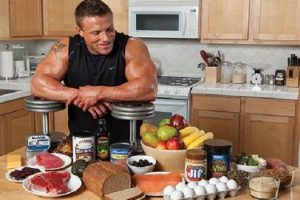Introduction
In today’s fitness-centric world, many people strive to build muscle mass. While exercise plays a vital role in gaining muscle, a well-balanced diet is equally important. Proper nutrition provides the body with essential nutrients that support muscle growth, repair, and recovery. In this article, we will explore the relationship between muscle mass and diet, focusing on key dietary principles and strategies for optimizing muscle growth.
- Understanding Muscle Mass
Before delving into the impact of diet on muscle mass, it is crucial to understand what muscle mass entails. Muscle mass refers to the total weight of muscles in the body, including both skeletal and smooth muscles. Skeletal muscles are responsible for voluntary movement, while smooth muscles control involuntary functions like digestion and blood vessel constriction. Increasing muscle mass leads to enhanced strength, endurance, and overall physical performance.
- The Role of Protein
Protein is often hailed as the building block of muscles, and for a good reason. It is composed of amino acids, which are essential for muscle repair and growth. When we engage in resistance training or other forms of exercise, our muscle fibers undergo microscopic tears. Protein helps repair these tears, leading to muscle growth and increased mass. Including high-quality protein sources such as lean meats, fish, eggs, dairy products, and plant-based proteins like legumes and tofu, is crucial for maximizing muscle development.
- Caloric Surplus for Muscle Gain
To build muscle mass, it is necessary to consume more calories than your body burns throughout the day. This surplus of calories provides the energy required for muscle growth. However, it is vital to maintain a balance and not simply indulge in unhealthy, calorie-dense foods. Focus on consuming nutrient-dense foods that provide a steady supply of energy, such as whole grains, fruits, vegetables, and healthy fats. Monitoring your caloric intake and ensuring a slight surplus will allow for gradual muscle gain without excessive fat accumulation.
- Carbohydrates for Energy
Carbohydrates are the primary source of energy for the body, especially during intense workouts. When consumed, carbohydrates break down into glucose, which is stored as glycogen in muscles and the liver. During exercise, these glycogen stores are utilized to fuel muscular contractions. To support muscle growth, it is crucial to consume an adequate amount of carbohydrates. Opt for complex carbohydrates like whole grains, legumes, and starchy vegetables, as they provide sustained energy release and promote satiety.
- Essential Fatty Acids
Many people tend to overlook the importance of dietary fats when it comes to muscle mass development. However, healthy fats play a vital role in hormone production, including testosterone, which contributes to muscle growth. Incorporating sources of essential fatty acids such as avocados, nuts, seeds, and fatty fish into your diet can help maintain optimal hormone levels and support muscle building.
- Hydration and Muscle Health
Staying hydrated is essential for overall health and plays a crucial role in muscle function and development. Water acts as a medium for nutrient transportation, waste removal, and temperature regulation within the body. Dehydration can negatively affect muscle performance and recovery. Aim to drink an adequate amount of water throughout the day, especially before, during, and after workouts, to optimize muscle function and growth.
- Timing and Meal Frequency
In addition to the types of foods consumed, the timing of meals and overall meal frequency also impact muscle mass development. Providing the body with a steady flow of nutrients is crucial for maintaining an anabolic (muscle-building) state. It is recommended to consume protein-rich meals or snacks every 3-4 hours to ensure a continuous supply of amino acids for muscle repair and growth. Additionally, consuming a balanced meal containing protein and carbohydrates within an hour after a workout can help kickstart the recovery process and enhance muscle adaptation.
Conclusion
Achieving optimal muscle mass requires a combination of consistent exercise and a well-planned diet. The dietary principles discussed in this article, including adequate protein intake, caloric surplus, carbohydrate and fat consumption, hydration, and meal timing, all play vital roles in promoting muscle growth. By incorporating these strategies into your lifestyle and maintaining a balanced approach, you can maximize your muscle mass gains and achieve your fitness goals. Remember, consult with a healthcare professional or registered dietitian before making any significant changes to your diet or exercise routine.





Add Comment